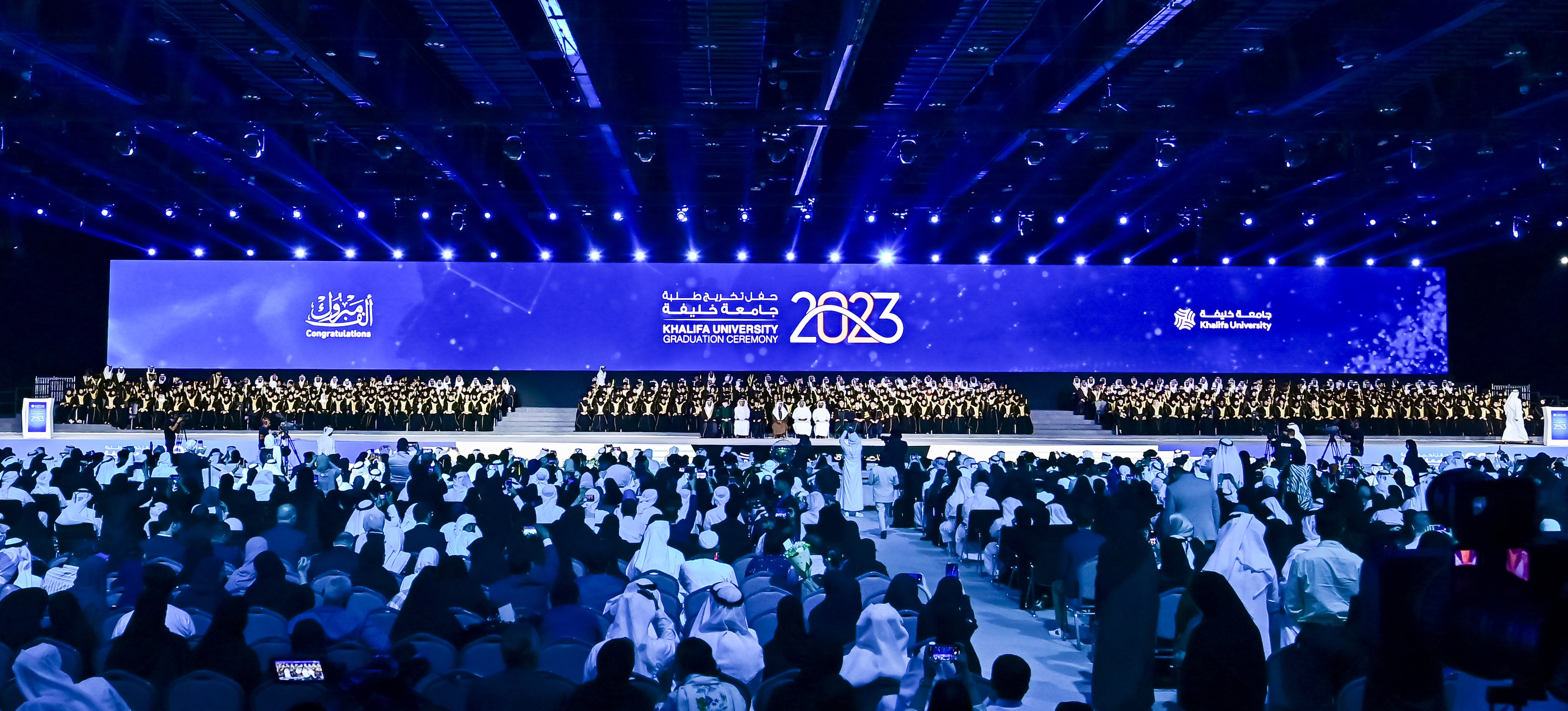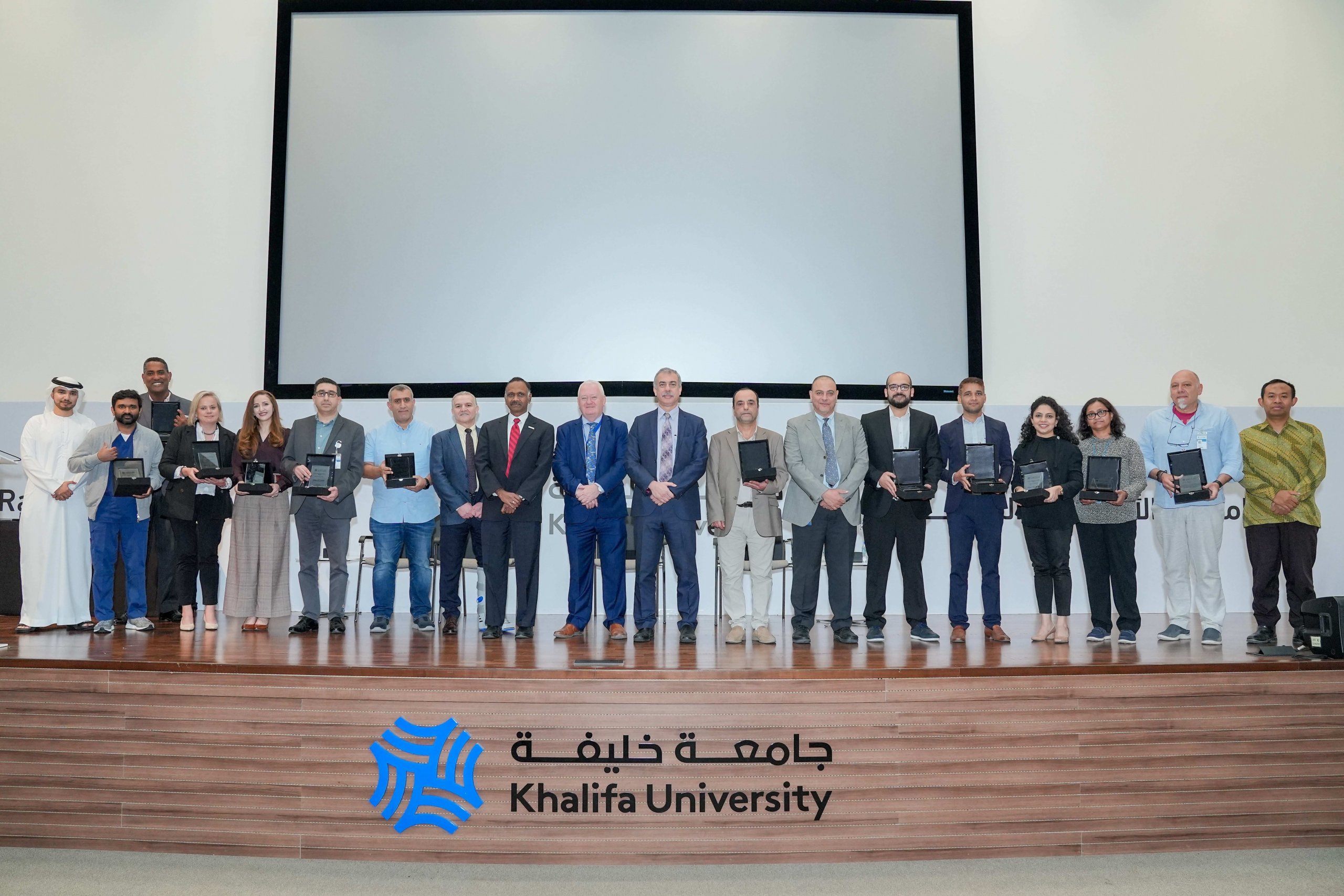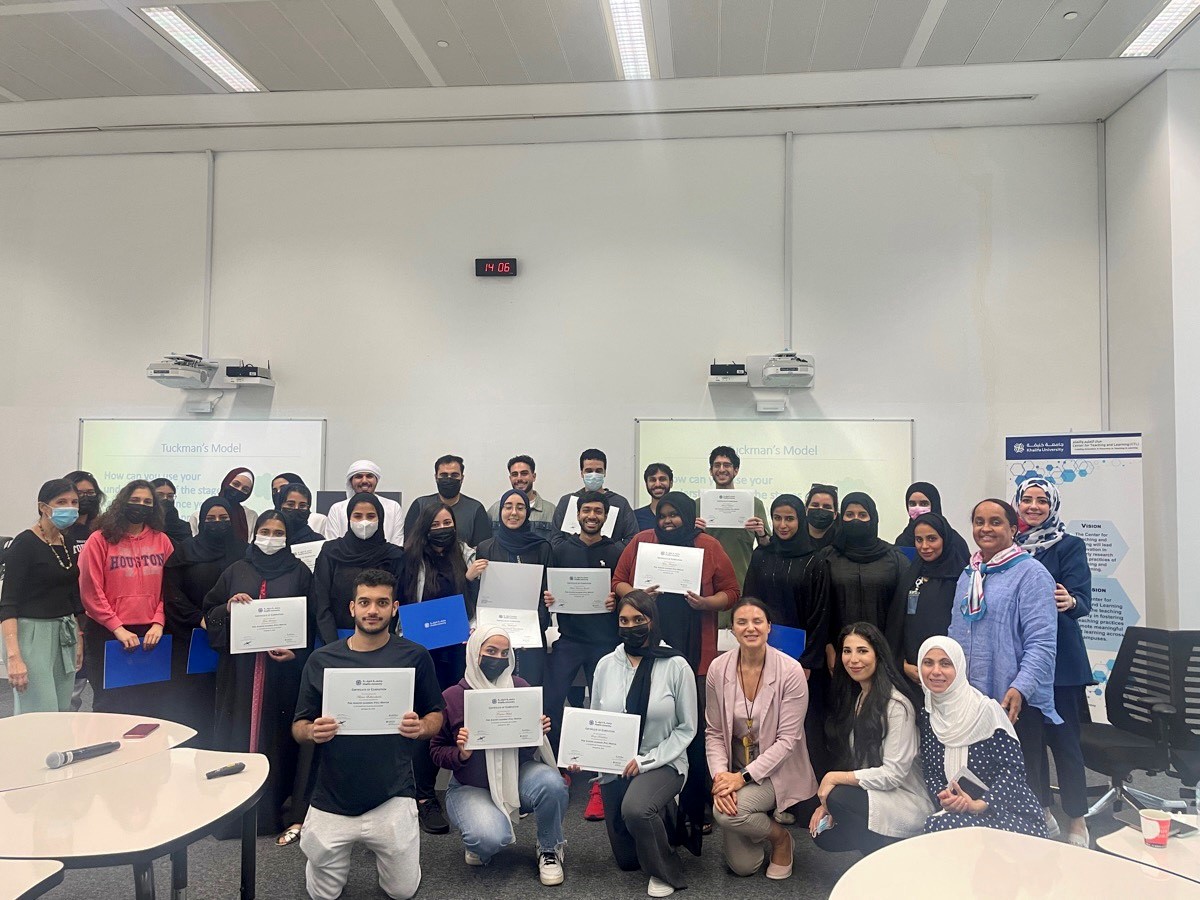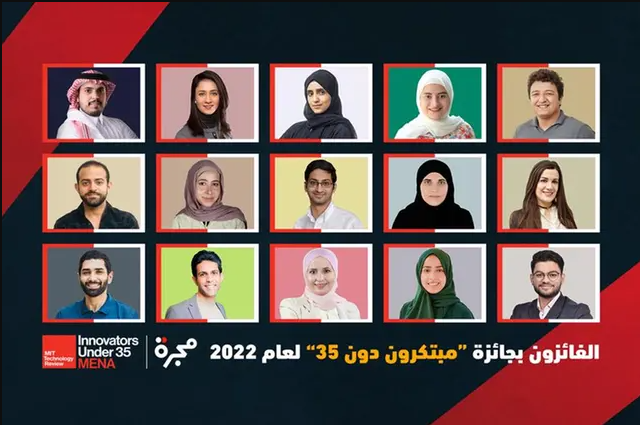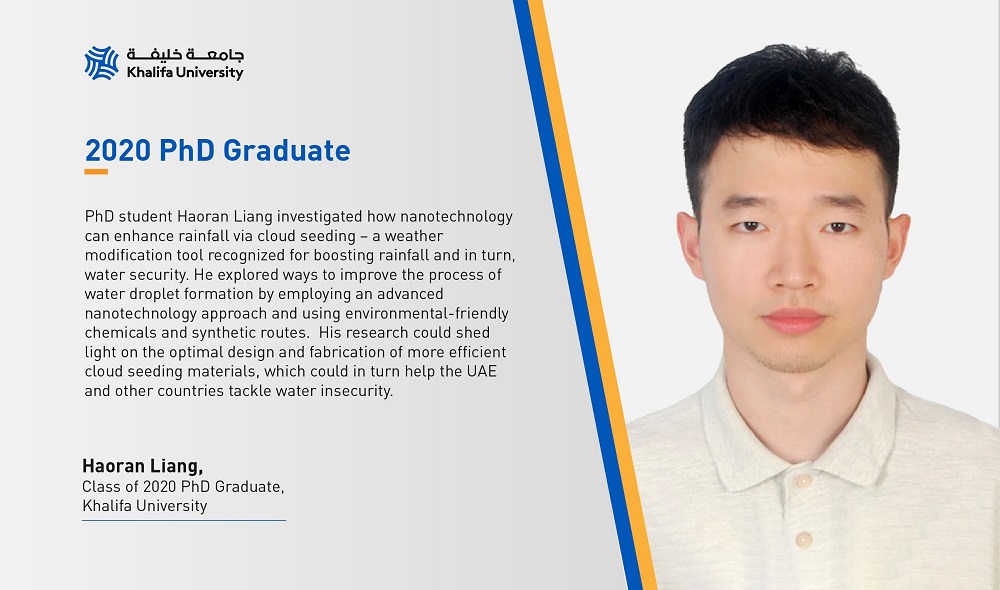
Khalifa University’s Class of 2020 graduates from the PhD in Engineering program are ready to take on the world’s most pressing climate, healthcare, water and energy related challenges.
A total of 17 students from the doctoral program have successfully defended their thesis. Now, a new cadre of talented, highly skilled young professionals, will enter the workforce prepared to lead with integrity and ingenuity – two values deeply embedded in the Khalifa University community and critically needed to overcome the challenging environment caused by Covid-19, as well as other pressing challenges of the 21st century.
The research output of the engineering graduates has resulted in nearly 55 published scientific papers in prestigious journals and conference proceedings, as well as some patents and numerous recognitions.
Dr. Arif Sultan Alhammadi, Executive Vice President of Khalifa University, said: “We are immensely proud of our doctoral students. The high-quality research conducted by our PhD graduates reflects the University’s exceptional doctoral degree program that covers a multitude of disciplines and aims to produce graduates capable of finding innovative engineering solutions to our shared complex problems. They have significantly contributed to the university’s research productivity, as well as our efforts to support Abu Dhabi’s transformation into a knowledge economy focused on innovative sectors. We are confident that they will go on to help build a sustainable future for the UAE, and the world.”
Through their academic research, the doctoral students addressed many complex challenges directly related to the UAE’s key economic sectors, including renewable energy, water and the environment, health, and robotics.
Their scientific advancements and engineering feats are advancing new, high-efficient solar technologies, better ways to improve precision drug delivery and medical diagnoses, models that can reduce a building’s energy footprint, search and rescue robots to support on the front lines of major disasters, membranes that can remove saltwater efficiently, and more.
Following are a few of the research highlights from KU’s Spring 2020 PhD Engineering graduates:
Clean and Renewable Energy
Developing highly efficient renewable energy sources to power the world’s growing energy demands sustainably is a key challenge of our time. Many students at Khalifa University, including doctoral student Harry Apostoleris, have taken on this challenge by researching new ways to harness the full spectrum of the sun’s energy for clean electricity.
Apostoleris researched an underutilized set of solar energy technologies: concentrator photovoltaics (CPV), which involve focusing sunlight onto highly efficient solar cells. Under the supervision of Dr. Matteo Chiesa, Professor of Mechanical Engineering, the student conducted an in-depth study of the current economic situation of CPVs, assessed their technical limitations, and argued for prioritizing maximal use of the solar resource in the design of new solar energy harvesting systems. He also conducted a number of feasibility studies to determine how to use light-splitting CPV systems in different applications, including for agricultural photovoltaics, utility- and industrial-scale heat production and water desalination.
The work bridges the gap between academic engineering research and industrial application, with the ultimate aim of the research to bring the ongoing renewable energy revolution to its next stage. One book, four scientific papers in high-impact journals (including Nature Energy), and five conference papers were produced as a result of this research.
Being able to produce more solar and renewable energy is critical, but just as important is being able to transmit that energy to homes and businesses through the electric power grid. The variable nature of renewable energy poses a serious challenge to the power grid. The grid must be flexible enough in order to cope with these variations.
PhD student Baraa Mohandes, under the supervision of Dr. Mohamed Shawky El Moursi, Professor of Electrical Engineering and Computer Science, explored ways to improve the power grid’s flexibility, with a focus on demand response programs. He identified shortcomings in existing optimization formulas, created a new smart contract to appeal to the residential sector, and designed a new operation framework for renewable energy sources, which would reduce fast variations on the renewable energy plant side.
Another student investigated how to improve the production of hydrogen, a harmless, zero-emissions fuel source. Habeebllah Oladipo, who was advised by Dr. Giovanni Palmisano, Associate Professor of Chemical Engineering, and Dr. Khalid Al Ali, Assistant Professor of Chemical Engineering, researched how to free hydrogen from hydrogen sulphide gas – a toxic gas and waste material widely found in the oil and gas industry – by improving the reaction efficiency of a titanium dioxide catalyst. Oladipo developed a model that would predict when a titanium dioxide catalyst would deactivate, and then select the proper operational conditions to avoid this. His work will contribute to the further optimization of the photocatalytic production of hydrogen from hydrogen sulphide gas.
Water and Environment
The urgent need for more efficient ways to produce freshwater sustainably is another shared challenge. One way to meet this need is by improving wastewater treatment. Traditional treatment technologies are inefficient against micro-pollutants and pharmaceuticals, which are hard to remove. Tertiary stage treatment technologies, however, can degrade many of these difficult pollutants. PhD student Ahmed Yusuf, also advised by Dr. Palmisano, investigated how microfluidic reactors can be improved to degrade difficult pollutants more efficiently in tertiary stage wastewater treatment. His improved designs complement heterogeneous photocatalysis, another effective tertiary stage treatment technology, and contribute important findings to the global efforts to turn wastewater sustainably into a safe source of potable water.
PhD student Elham Ali Abdulkarim also investigated ways to improve wastewater treatment. Under the supervision of Dr. Shadi Hasan, Associate Professor of Chemical Engineering, Abdulkarim developed a nano-enhanced membrane to improve a membrane’s ability to filter heavy metals from wastewater. She coated zirconium phosphate nanoparticles, which have exceptional qualities like high ion-exchange abilities and high thermal stability, onto polymer-based membranes. The nano-enhanced membrane proved to remove heavy metals from wastewater more effectively than traditional polymer membranes, findings which could help accelerate the adoption of advanced membranes in wastewater treatment plants locally and abroad.
Another important tool that can be leveraged to produce more freshwater sustainably is rain enhancement. PhD student Haoran Liang investigated how nanotechnology can enhance rainfall via cloud seeding – a weather modification tool recognized for boosting rainfall and in turn, water security.
Throughout the course of his doctoral studies, Liang, under the supervision of Dr. Linda Zou, Professor of Civil Infrastructure and Environmental Engineering, synthesized and tested three different types of novel cloud seeding materials. He explored ways to improve the process of water droplet formation by employing an advanced nanotechnology approach and using environmental-friendly chemicals and synthetic routes. His research could shed light on the optimal design and fabrication of more efficient cloud seeding materials, which could in turn help the UAE and other countries tackle water insecurity.

Another area that requires innovation is desalination. Finding ways to make the salt removing process more energy efficient is a priority for water scarce countries like the UAE. Tackling this issue is PhD student Adetunji Alabi, who has developed ion exchange membranes – which use electrical charge separation, rather than heat or pressure to remove salt from water – by using atomically thin sheets of graphene. Alabi, who also worked under Dr. Zou, demonstrated that his membrane worked more effectively than a sample commercial ion exchange membrane. The outcomes from his numerous tests and experiments showed promising results for the use of his membrane in electromembrane desalination processes such as electrodialysis and membrane capacitive deionization. His work was a collaborative research effort with The University of Manchester.

In addition to electricity and water, a large portion of the energy mankind uses goes toward keeping our buildings cool. With people spending close to 90% of their lifetime in buildings, indoor conditions can have important implications on people’s comfort, health, and wellbeing. A doctoral thesis aimed at improving a building’s performance holistically was led by PhD student Min Lin, under the supervision of Dr. Elie Azar, Associate Professor of Industrial and Systems Engineering.
Lin’s research was aimed at evaluating and improving the interaction between people and their built environment in order to optimize energy consumption and comfort. Lin developed a multidisciplinary framework that combined machine learning, human or ‘agent-based’ modeling, data collection, and statistical modeling. The framework successfully illustrates the approach that is needed to address current and future sustainability challenges facing the built environment, supported by case studies and applications in the UAE and abroad.
Healthcare
New solutions aimed at improving medicine and drug delivery will go a long way in advancing human health and longevity, prompting scientists around the world to explore the use of nanotechnology as an effective way to deliver medicine to the body. However, the physical and chemical stability of nanoparticles is poorly understood.
PhD student Nahla Rizk investigated the issue of nanoparticle stability in biomedical applications in her dissertation. Rizk, under the supervision of Dr. Matthew Martin, Assistant Professor of Physics, tested the stability of four different types of gold nanoparticles, each with a different coating nature. Using different chemicals, she replicated common destabilizing environments that can affect nanoparticles to different extents, depending on the nature of the coating material, and decrease the efficiency of different treatments. She developed a novel method for assessing the stability of the nanoparticles, which could help scientists better identify and predict how a given nanoparticle will perform in a certain environment. The new process could help ensure the right nanoparticles are used to deliver lifesaving drugs in the future.
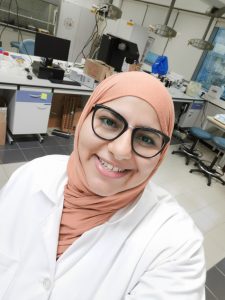
Another technology gaining traction in the healthcare industry is the ‘lab-on-chip.’ One of the major applications of lab-on-chip devices is their ability to rapidly diagnose infectious diseases. Because they are tiny, low-cost and portable, lab-on-chip devices are easy to use in the developing world, where fighting infections is most critical.
PhD student Soha Yousuf investigated ways to improve the sensitivity and limit detections of optical sensor devices so they can be even more accurate at making complex diagnoses. This was achieved by designing a low-cost photonic device called a micro-ring resonator that is novel in its suspension design. At a selected wavelength of light, these designed micro-ring resonator bio-sensors could detect the presence of targeted molecules in blood or saliva that could be indicative of a certain illness. Some of these micro-ring resonator designs were also tested to detect very minute variations in gases that could be useful in environmental and medical applications. The designs were also incorporated onto a system-level scale that could be commercialized as a lab-on-a-chip device.
Under the supervision of Dr. Jaime Viegas, Associate Professor of Electrical Engineering and Computer Science, Yousuf successfully designed, developed and tested novel, low-cost micro-ring resonator designs on a silicon-on-insulator (SOI) platform – a type of platform that makes the design of such bio-sensors easily scalable.
Robotics & Autonomous Systems
With climate change accelerating the rate of natural disasters across the world, the need for search and rescue robots capable of navigating unstructured terrain to support rescue missions is needed more than ever. PhD student Reem S. K. Ashour, under the supervision of Dr. Nawaf AlMoosa, Assistant Professor of Electrical Engineering and Computer Science and Director of EBTIC, created a system using AI that assists first responders in mapping and exploring the urban search and rescue environment before they enter it.
Ashour programmed an exploration and mapping system that utilizes deep learning models and sensors, which were deployed on autonomous robots, giving them the ability to locate victims, objects, and risk sources. The developed system creates a 3D semantic map of the environment, which is a map that contains spatial information and assigns labels to different mapped features. The system also helps the robot choose the next best exploration position. This advanced mapping capability helps the robot effectively identify and locate different types and levels of hazards, as well as any occupants in the environment. Ashour’s system proved to outperform the state-of-the-art methods in several performance measures.
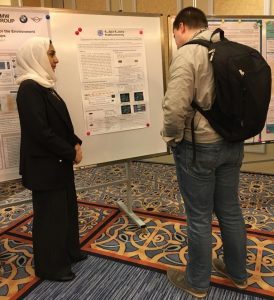
Autonomous systems are also playing increasingly important roles across a range of major industries. PhD student Yusra Abdulrahman, under the supervision of Dr. Mohammed Omar, Department Chair and Professor of Industrial and Systems Engineering, developed an innovative technique to improve autonomous nondestructive testing – a way to analyze the properties of a material, component or system without causing damage. The UAE National developed a technique, which combines infrared thermography, principal component analysis and artificial neural networks, to improve autonomous defect detection in low conductive materials with little to no human intervention. The study could help advance the manufacturing sector in the UAE by contributing insight into the latest innovative technologies and inspection methods on the market, while improving the productivity and the quality of UAE’s industries. By applying this technology, the UAE would achieve sustainable manufacturing growth and strengthen the nation’s global competitiveness.
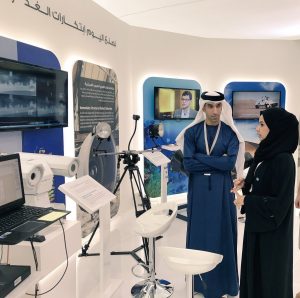
Information Communication Technology
The internet today is based on billions of computers interconnected by optical fibers. Light carries the information across the globe in those extremely thin fiber wires. A new technological revolution is taking place, where scientists are creating miniature optical circuits, that steer light into different paths depending on their content. This will push for much larger bandwidths available for 5G networks and beyond.
PhD student Salim Alkaabi, under the supervision of Dr. Jaime Viegas, investigated how light and matter interact in silicon, which is the building material to all electronic chips we use today, towards developing micrometer devices that can encode information on light streams travelling on tiny wires, a thousand times smaller than the diameter of an average human hair.
Blockchain is another computing innovation that has the potential to transform the way we bank, interact online, and keep our data secure. Unfortunately, though, the full range of blockchain applications are not being realized many newly created blockchain applications were developed without following proper software engineering methodologies, fueling a general lack of trust in these blockchain technologies. Because blockchain, which is defined as a decentralized distributed database or ledger system, having trust in its records is critical to its successful implementation.
PhD student Hamda Al Breiki, under the supervision of Dr. Davor Svetinovic, Associate Professor of Electrical Engineering and Computer Science, studied the issue of trust in blockchain-based applications. The UAE National developed a trust requirement model for blockchain applications, along with a trust requirement engineering methodology. Her findings revealed the importance of incorporating trust right at the beginning of a software development process in the future development of blockchain applications. This research work produced significant contributions in the area of blockchain-oriented software engineering which can be further explored and developed.
Conclusion
With these projects and others being carried out by Khalifa University’s engineering PhD students, KU is accelerating the technological and industrial innovations required to achieve the UAE’s strategic goals and knowledge economy transformation. Importantly, they are nurturing the next generation of engineers who will positively contribute to the new policies and innovative solutions needed to overcome the most pressing challenges of the 21st century.
Erica Solomon
Publication Senior Specialist
21 October 2020



